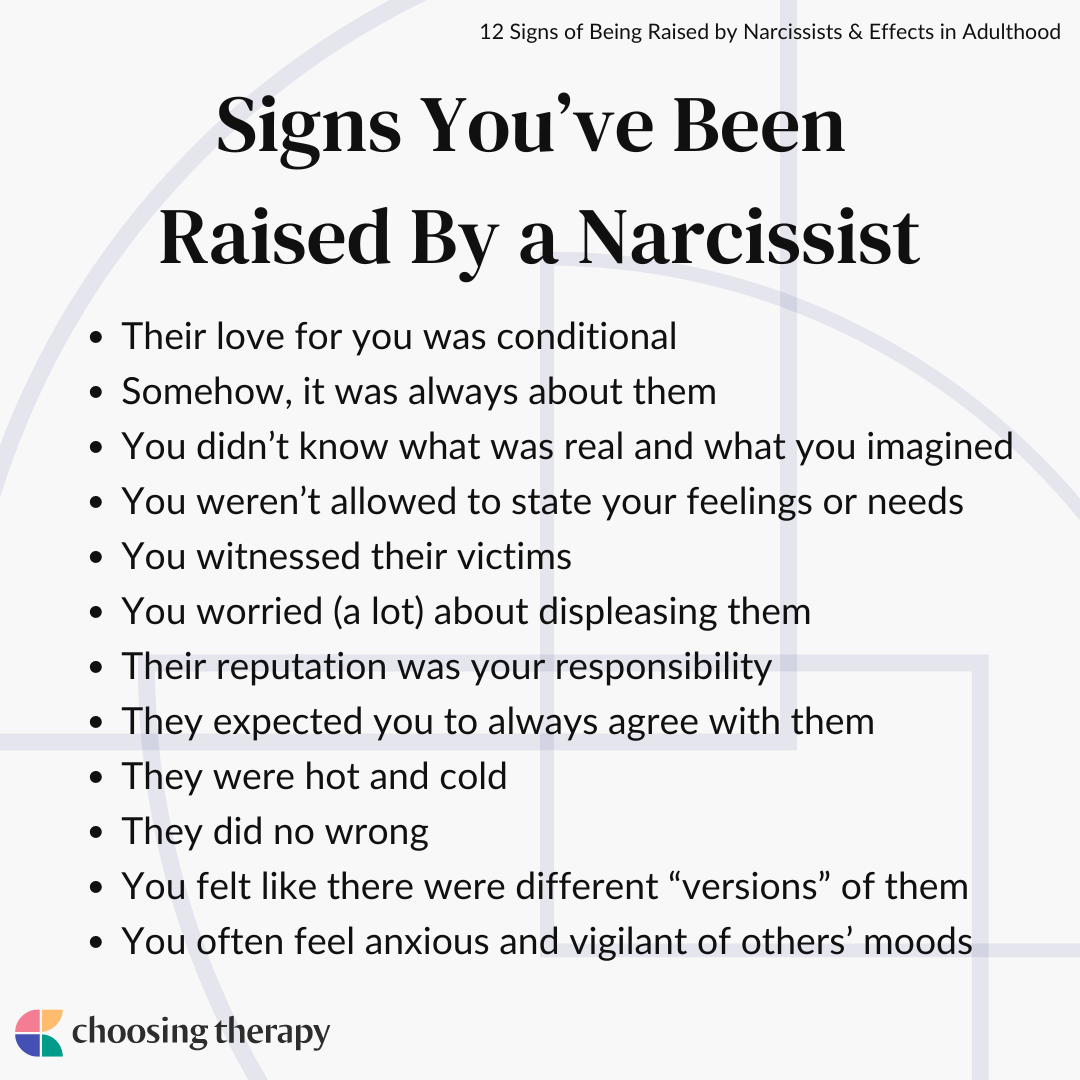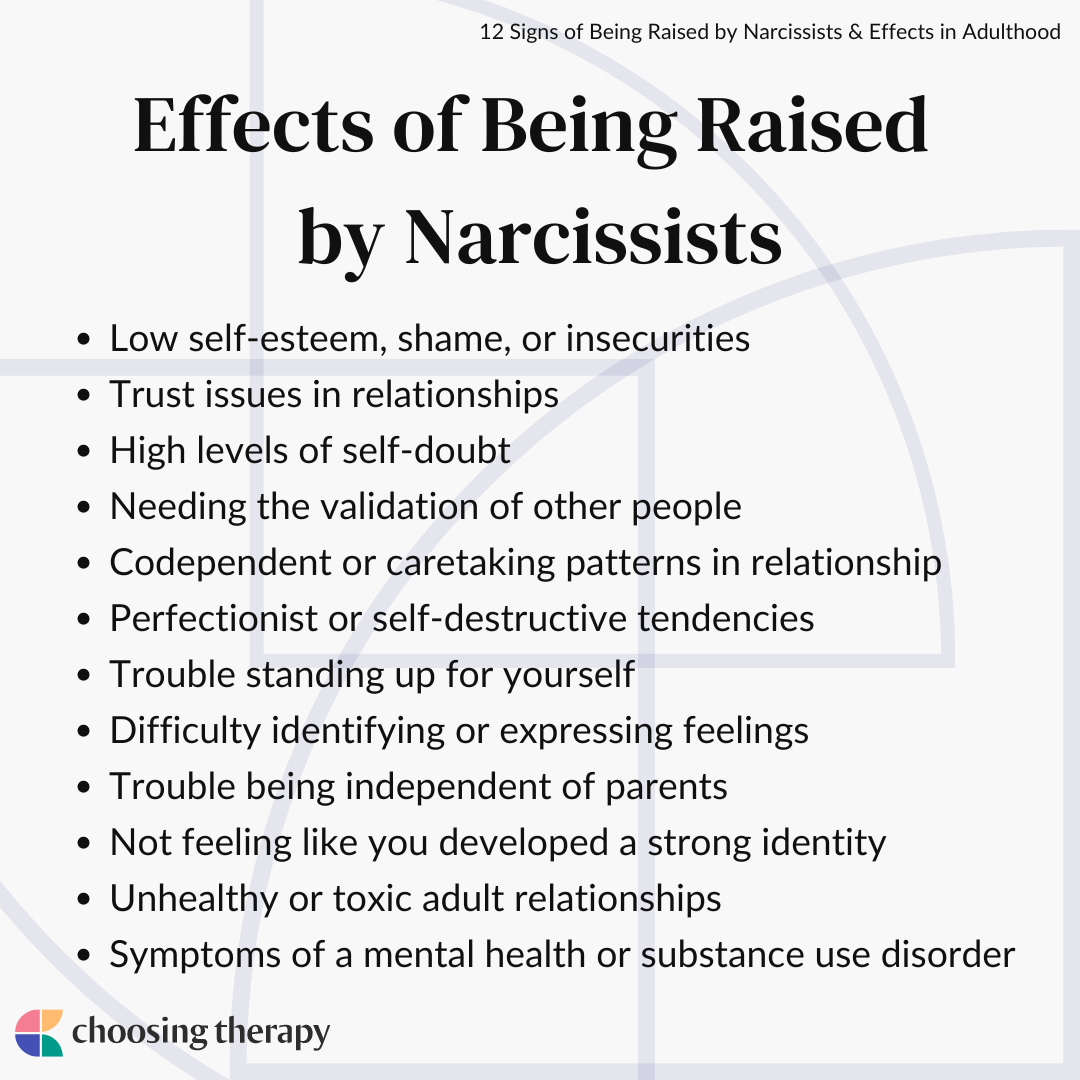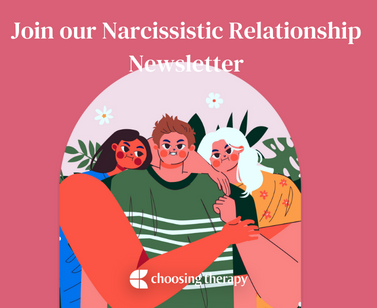As parents, narcissists are often emotionally unavailable, neglectful, and abusive. Unfortunately, their children typically have difficult childhoods where they constantly try and fail to live up to the changing expectations of their parents. Children begin to believe that their parent’s love is conditional, which can result in struggles with self-esteem, anxiety, depression, and unhealthy relationships that follow them into adulthood.
Have A Narcissist Parent?
Therapy can help you navigate the relationship as an adult. BetterHelp has over 20,000 licensed therapists who provide convenient and affordable online therapy. BetterHelp starts at $60 per week. Take a Free Online Assessment and get matched with the right therapist for you.
Characteristics of a Narcissistic Parent
Narcissistic parents are often emotionally abusive to their children, holding them to impossible and constantly changing expectations. Those with narcissistic personality disorder (NPD) are highly sensitive and defensive. They tend to lack self-awareness and empathy for other people, including their own children.1,2 Narcissistic parents are frequently described as being unpredictable, or “hot and cold,” making it hard for children to know what to expect.3,4,5,6 Narcissistic abuse is common and can have lasting negative impacts on children that last into adulthood.
According to W. Keith Campbell, Ph.D., Social Psychologist, Professor at the Department of Psychology at the University of Georgia, “It can be very challenging to judge your own parents. In some situations the child can feel very special and cared for, if not fully loved. In other cases, narcissistic parents may be very abusive. Often this is a question for therapy in adulthood, but it can also be helpful talk to siblings or peers, or even friends of one’s parents to get a better idea of who they really are.”8
10 Signs You’ve Been Raised By a Narcissist
Narcissists can be hard to spot because they tend to put a lot of energy and effort into maintaining their reputation and appearing normal, but it’s especially difficult to recognize NPD in the people closest to us. Parents with NPD tend to be skilled at using narcissistic phrases that twist reality in ways that cause their children to doubt themselves and their perception, all while portraying themselves as loving, concerned parents.
Below are ten signs that you were raised by a narcissist:
1. Their Love for You Was Conditional
One of the most common signs of being raised by narcissists is feeling unloved and that it was your fault because you did or did not do something the right way.3,4 This is called “conditional love” because there are certain conditions that have to be met in order to receive it. Conditional love is common in abusive homes and has devastating long-term effects on children.
When the parent is narcissistic, the conditions for love usually revolve around the emotional needs and self-esteem of the parent. When the child makes the parent feel good about themselves, important, or special, narcissistic parents will often show love and affection towards their child. When the parent feels bad about themselves or the child fails in some way, the parent may ignore them, be cruel to them, or even become abusive.3,4,5
2. Somehow, It Was Always About Them
People with NPD have a way of always making a situation about them. Their tendency to make do so may have meant that you felt unheard, unseen, and invisible growing up.4 Even during moments that were supposed to be about you (i.e. your birthday, graduation, etc.), your parent may have found a way to make themselves the center of attention.
Dr. Amy Brunell, Professor of Psychology at Ohio State University states, “Because narcissists operate in an ‘all about me’ fashion, the world revolves around them, their needs, and desires. They continue to be selfish and expect others, including their children, to cater to them. So, when their child does well, they take credit and brag about the child, and when the child struggles, they blame the child or others for it. They are controlling and they readily induce guilt in their children. They tend not to offer much by way of emotional support and validation, and the child quickly learns that the parent’s goals are important whereas their own goals are not. This is frequently because the parent is living their own lives through the child and the child’s accomplishments.”9
Below are some examples of how narcissistic parents make everything about themselves:
- Conversations are always about them instead of you.
- They took credit for your achievements.
- They created conflict or drama to draw attention to themselves.
- They made everything personal, even when it had nothing to do with them.
- They always needed to ‘one-up’ you when you achieved something.
3. You Didn’t Know What Was Real & What You Imagined
Another sign you were raised by narcissists is experiencing self-doubt. Narcissists are often skilled at narcissistic gaslighting, which is the abusive tactic of twisting and distorting the truth in ways that can make a person question and doubt reality.7 Over time, this causes children to doubt themselves and their reality, even making them wonder if they are imagining things or going crazy.
Some examples of narcissistic gaslighting include:7
- Telling you that you are imagining or making things up.
- Accusing you of exaggerating the truth.
- Listing past times when they say you lied, imagined, or made something up.
- Twisting what you said or did or what happened.
4. You Weren’t Allowed to State Your Feelings or Needs
If you felt like it wasn’t okay for you to tell your parent how you felt or what you needed growing up, it may be an indication that your parent has NPD. Children of narcissists learn early that the things they feel, want, and need don’t matter to their parents, and learn to keep these to themselves.
Sometimes, children raised by narcissists struggle to identify how they feel, as they’ve become so used to repressing these inner emotions, wants, and needs. This can continue into adulthood, causing them to feel uncertain about who they are, what they like and don’t like, or to have a hard time making their own decisions.3,6
5. You Witnessed Their Victims
Narcissists don’t have the capacity to have healthy, mutual relationships where they attend to the feelings and needs of other people. This is why most narcissists have a pattern of unhealthy or broken relationships. Severe narcissists often have a long list of people whom they use and then discard.2
A narcissistic parent may exhibit relational behaviors such as:
- Talking poorly about other people.
- Overreacting to the slightest criticism.
- Becoming aggressive or passive-aggressive to others.
- Taking advantage of or using people for their own needs.
- Becoming jealous or competitive with people who had something they didn’t.
- Guilting or manipulating other people to get what they want.
Are you dating or married to a narcissist?
Whether you’re trying to move on or rebuild a relationship, a licensed therapist can guide you. BetterHelp has over 20,000 licensed therapists who provide convenient and affordable online therapy. Visit BetterHelp
Is your mother, father, or family member a narcissist?
Being raised by a narcissist can damage your confidence and self-esteem. A therapist from Online-Therapy can help you both heal from the past, and manage the relationship to be less harmful. Counseling starts at $50 per week. Try Online-Therapy
6. You Worried (a Lot) About Displeasing Them
It’s normal for a child to want to please their parent, but if you had a narcissistic parent, you might have lived in fear of displeasing your parent. Often, this fear comes from seeing what happened to others who upset them or experiencing it firsthand. Many children of parents with NPD go to great lengths to please their parents with limited success. This is because what it takes to please their parents one day might change the next, meaning that children live in a state of constant stress and fear. The punishments you received might have also varied widely depending on what mood your parent was in, leaving you constantly guessing.5
7. Their Reputation Was Your Responsibility
Because narcissists are so dependent on the validation, recognition, and admiration of others, their children are expected to help them maintain a perfect appearance.3 As Dr. Campbell notes, “the child can become an extension of the narcissistic parents’ ego,” which often includes helping the parent maintain a certain image or reputation.
Some of the ways you may have been expected to protect your parent’s image include:
- Being punished severely for embarrassing your parent.
- Being bullied about your own appearance, weight, or performance.
- Not being allowed to share certain details about them or their life with others.
- Being treated like an ‘accessory’ to your parent for photo ops and public image.
- Being lectured about how your actions reflect poorly on them.
- Wanting you to be successful enough to brag about, but not so successful that it triggers their jealousy or makes them feel inferior to you.
8. They Expected You to Always Agree With Them
Because narcissists have very fragile egos, having a different opinion, belief, or idea can be seen as a threat. Children of narcissists are often denied the right to have their own emotions or make their own choices.4 For example, if your parent hated someone, you may have also been expected to hate that person too. If they had an opinion, they expected you to second it. In times when you didn’t, you may have paid the price. Your parent may have become cold, cruel, or abusive towards you for disagreeing with them.
9. They Were Hot & Cold
Narcissists are often as skilled at reeling people in as they are at spitting them out. “Love bombing” is one of the common terms used to describe ways someone with NPD draws people close to them and involves showing a lot of affection, care, and concern for a person to get close to them.
Unfortunately, this behavior doesn’t last and usually ends with either an anger outburst, the silent treatment, or another emotionally abusive form of punishment. If you had a parent with NPD, you have probably experienced both the love bombing and the emotional neglect that followed it. This may have confused you as a child, causing you to feel like if you “just tried harder” they would treat you better.
10. They Did No Wrong
At the core of NPD is a deep sense of shame and inadequacy, and most of the symptoms of the disorder function to protect the person from it. This includes their defenses of blaming other people, lashing out, denying their mistakes, and needing to maintain a perfect appearance. Unfortunately, this means that most narcissistic parents will not admit that they did anything wrong or acknowledge their shortcomings as parents. If you had a narcissistic parent, you may have been blamed for many things that weren’t really your fault. If you ever tried to confront your parent about the ways they mistreated you, you probably did not get the apology you wanted from them.
Would you like help recovering from a narcissistic parent?
BetterHelp has over 20,000 licensed therapists who provide convenient and affordable online therapy. BetterHelp starts at $65 per week. Take a Free Online Assessment and get matched with the right therapist for you.
Effects of Being Raised by Narcissists
The effects of being raised by a narcissistic parent can vary depending on how severe the NPD was, how much time you spent with that parent, and what other supports you had in your life. The more severe your parent’s narcissism was, the more time you spent with them, and the less support you had, the more likely you are to experience lasting negative impacts. In many instances, children suffered abuse from their NPD parent and may have developed symptoms of post-traumatic stress disorder (PTSD).
Dr. Brunell says, “The child typically suffers from low psychological well-being, such as low self-esteem, depression, and anxiety. They tend to try to please others and have poor ability to set boundaries or to say no to people’s requests. This is because they have learned through their childhood that they are not as important as other people are.”
Being raised by narcissists can result in some of the following issues:3,4,5,6
- Low self-esteem, shame, or insecurities: NPD parents may shame or ridicule their children, leading them to be insecure in adulthood
- Trust issues in relationships: Secrets, insecurities, and emotions are weaponized by NPD parents and can lead to trust issues.
- High levels of self-doubt: Gaslighting, narcissistic manipulation tactics, and rage outbursts cause people to doubt themselves.
- Needing the validation of other people: Children learn from their parent’s behaviors, including narcissists in need of narcissistic supply, so you might find yourself being an approval addict.
- Codependent or caretaking patterns in relationships: The feelings, needs, and wants of NPD parents become their child’s responsibility.
- Perfectionist or self-destructive tendencies: NPD parents have impossible standards that their kids internalize or rebel against, which may lead to perfectionism or impulsivity later in life.
- Trouble standing up for yourself: Children of NPD parents are often punished or shamed for asserting themselves.
- Difficulty identifying or expressing feelings: Children of narcissistic parents learn to repress their feelings, wants, or needs.
- Trouble being independent of parents: NPD parents often work hard to keep their children dependent on them.
- Not feeling like you developed a strong identity: Normal identity development doesn’t occur in abusive homes.
- Unhealthy or toxic adult relationships: Families of origin become the model for adult relationships, and attachment issues develop when there is childhood trauma.
- Symptoms of a mental health or substance use disorder: There are negative long-term effects that result from abuse, neglect, and unhealthy home environments.
When & How a Therapist Can Help
In order to recover from narcissistic abuse, it’s important to seek help from a professional counselor. Individual therapy may be helpful for those just beginning the healing process, but group therapy can also offer you the ability to connect with people who have had similar experiences. If your parent has taken accountability for their actions and is willing to work on their relationship with you, family therapy could also be an option.
According to Dr. Cambell, “Therapy will help the patient understand what they were seeing and experiencing as a child with an adult level of understanding. Ideally, things that seem confusing will start to make sense.”
When you are in the process of finding the right therapist, it’s a good idea to look for someone who has experience in treating trauma and is knowledgeable about NPD. Using an online therapist directory can help you narrow your search to find a therapist who has certain specialties and is in-network with your insurance. With therapy, it is often possible to heal from narcissistic abuse and learn ways to move forward with your life.
A trained therapist can help someone recovering from narcissistic abuse syndrome by:
- Identifying old coping mechanisms that may be getting in the way of healthy relationships now and better ways of coping.
- Teaching you how to tell the difference between healthy and unhealthy relationships.
- Teaching you to communicate assertively, set boundaries, and avoid repeating toxic patterns you witnessed and experienced as a child.
- Getting in touch with your feelings, wants, and needs and learning to make decisions independently and doubt yourself less.
- Resolving shame, attachment wounds, and insecurities that result from unhealthy or abusive relationships with your parent.
- Identifying ways to set boundaries with your parent to reduce the negative impact they have on you and your life as an adult.
Final Thoughts
Being raised by someone who has NPD often means that as a child you didn’t get the love, support, and guidance you needed from your parent or caregiver. Many narcissistic parents are neglectful or abusive to their children, which can result in lasting negative impacts that continue into adulthood. With treatment, it is possible to heal from narcissistic abuse, learn ways to improve your mental well-being, and form healthy, fulfilling relationships as an adult.
Additional Resources
To help our readers take the next step in their mental health journey, Choosing Therapy has partnered with leaders in mental health and wellness. Choosing Therapy is compensated for marketing by the companies included below.
Online Therapy
BetterHelp – Get support and guidance from a licensed therapist. BetterHelp has over 20,000 therapists who provide convenient and affordable online therapy. Complete a brief questionnaire and get matched with the right therapist for you. Get Started
Online-Therapy – Online-Therapy.com provides a weekly live video session, unlimited text messaging, and self-guided activities like journaling. Starting at $64 per week, this is one of the most affordable options for CBT therapy. Try Online-Therapy
Narcissist Recovery Support Group
Circles – Anytime, anonymous, and free. Never feel alone during life’s greatest challenges. Drop-in to live conversations and share thoughts, ask questions, or learn from others on the same journey. Join Circles Now
Narcissism Newsletter
A free newsletter from Choosing Therapy for those recovering from narcissistic abuse. Get helpful tips and the latest information. Sign Up
Choosing Therapy Directory
You can search for therapists by specialty, experience, insurance, or price, and location. Find a therapist today.












